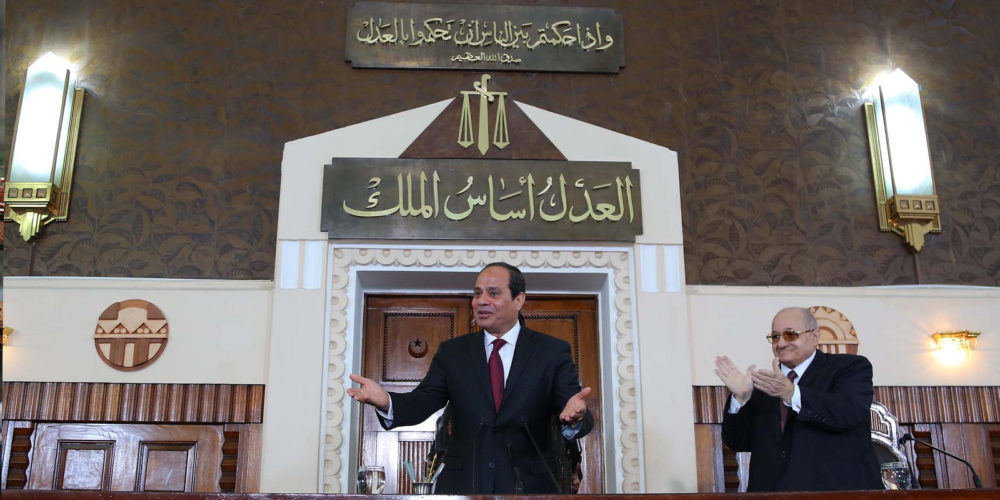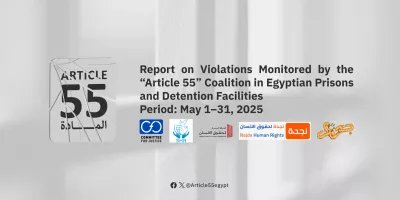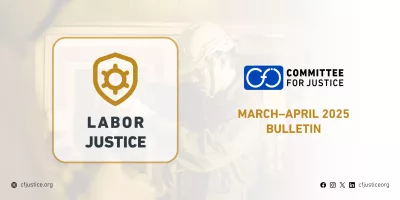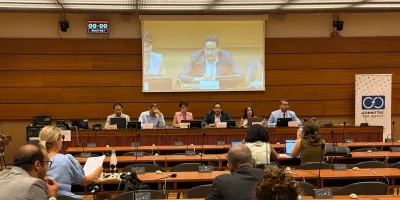In information provided for the upcoming thematic report of the United Nations Special Rapporteur on the Independence of Judges and Lawyers, the Committee for Justice and the Egyptian Front for Human Rights documented how the Egyptian authorities undermined the independence of the judiciary and prosecution, hindering the work of lawyers.
The Committee for Justice (CFJ) stated that the margin of independence granted to the judiciary in Egypt during the ousted president, Mohamed Hosni Mubarak’s era, significantly diminished after the military coup in 2013. This trend continued with the amendments introduced to the Egyptian constitution in February 2019, four of which specifically addressed the judicial system, bringing about radical changes.
According to insights on the Egyptian judicial system provided by CFJ in collaboration with the EFHR, the judiciary and prosecution in Egypt, tasked with safeguarding citizens against wrongdoing, have participated, in one way or another, in persecution and suppression, coordinating with security authorities and the ruling elite. Employees of these institutions misuse procedures and regulations to violate laws and the constitution.
The organizations also highlighted that the 2019 constitutional amendments allowed the president to assume the position of the head of the Supreme Judicial Council, granting him the authority to choose and suspend judges, compromising the independence of the executive authority. Additionally, the authorities “militarized” the judiciary by establishing numerous military courts, terrorism circuits, and special emergency courts.
The organizations shed light on the role of judges in the terrorism circuits of criminal courts, especially judges Naji Shhata, Hassan Fareed, and Sherine Fahmy, who became instrumental in undermining the rights of defendants, depriving them of their rights such as the right to appeal and issuing harsh sentences of imprisonment and death. The inclusion on terrorism lists was also exploited against opposition figures, activists, and human rights defenders, depriving them of their basic rights, including the right to freedom of movement, disposal of their property and assets, political rights, and subjecting them to social stigmatization.
The two organizations also highlighted a glaring example of the lack of independence of the Public Prosecution and the judiciary during the last presidential elections, from September 25 to October 14, 2023. Security forces arrested at least 128 members (including 13 women) of the former potential presidential candidate Ahmed El-Tantawi’s campaign during the period of collecting endorsements for the 2024 presidential campaign in Egypt. All of them were investigated before the Supreme State Security Prosecution (a specialized prosecution), facing charges in seven different cases, including spreading false news and joining a terrorist group. They were then referred, along with El-Tantawi and his campaign manager, to the Misdemeanor Court of Matariya on charges of influencing the electoral process as retaliation for exercising their legitimate right to political participation and public work.
The groups also addressed the situation of lawyers in Egypt in general, and human rights lawyers in particular. A research paper by CFJ shed light on the systematic practices of the Egyptian prosecution and judicial authority in targeting and harassing lawyers defending human rights defenders and prisoners of conscience. Testimonies unanimously affirmed that the judiciary and members of the public prosecution do not respect lawyers and violate defense rights during their attendance at investigation sessions and court hearings in cases of a political nature.
The organizations also pointed to the Egyptian Ministry of Justice’s decision No. 8901/2021, which initiated the application of the remote pretrial detention renewal system. This decision stated that lawyers attend video conference sessions in court alongside the judge, not with the accused at their place of detention. This illustrates the political will of the Egyptian authorities to undermine the rights of detainees in legal defense by preventing lawyers from communicating with their clients privately. It negates the purpose of remote hearings, which aim to protect all parties, including lawyers and court members, undermining fair trial standards and access to justice.
Regarding the targeting of lawyers by authorities, CFJ documented and verified numerous campaigns, cases, incidents, and violations in the Justice Watch Archive, providing information on justice system violations in Egypt. This archive includes a section dedicated to lawyers, documenting and monitoring the cases of 706 lawyers, most of whom faced abuse and arrest due to their work in the field of human rights, defending political prisoners and prisoners of conscience.
The organizations concluded their vision by stating that over the past decade, the Egyptian government has adopted policies to institutionalize violations, leading to numerous violations and depriving people of their civil, political, economic, and social rights. Additionally, the prosecution and judicial authority hinder lawyers from performing their duties, subjecting them to various violations, including arbitrary arrest, enforced disappearance, torture, execution, repeated detention, criminal prosecutions in politically motivated cases, exceptional military trials, exceptional State Security Emergency Court trials, and arbitrary inclusion on terrorism lists. The Egyptian authorities have also utilized the prosecution and judiciary to institutionalize violations against citizens.






